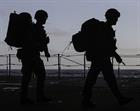Royal Marines launch 'assault' from HMS Queen Elizabeth
A troop of Royal Marines from 42 Commando in Plymouth has embarked in the Royal Navy’s new aircraft carrier to prove the process of launching them by helicopter to conduct operations ashore.
Marines from Lima Company and supporting elements from HMS Queen Elizabeth’s Ship’s Company have been called to ‘Assault Stations’ for the very first time, on exercise.
The troops were processed from their accommodation, through the ship, collecting kit, including weapons and ammunition in a carefully orchestrated process, in through the massive hangar and onto the flight deck to simulate being launched ashore by helicopter.
The Royal Navy’s amphibious assault capability has to now been provided by assault ships HMS Bulwark and Albion and the Landing Platform Helicopter (LPH), HMS Ocean.
Whilst HMS Queen Elizabeth does not have the surface assault capability with landing craft of the specialist ships, her four-acre flight deck provides plenty of scope from which to project manpower and equipment ashore using the variety of helicopters she will be able to host.
The ship is currently at sea conducting trials which will determine the operating parameters of several different helicopters, including Merlin Mk2, Mk3 and Mk4, Merlin Crowsnest, Chinook, Apache and Wildcat.
Marines are an adaptable force; that’s our USP as the UK’s amphibious forces. So to ask them to spend time at sea is not a surprise or a task too far for any of them
Lieutenant Colonel Mark Searight Royal Marines, Amphibious Operations Officer
Speaking as Assault Stations were successfully completed for the first time, the Ship’s Amphibious Operations Officer (AOO), Lieutenant Colonel Mark Searight Royal Marines, explained the importance of this capability:
“HMS Queen Elizabeth will maintain the United Kingdom’s ability to have a forward-based strategic conventional deterrent which has the ability not only to conduct strike operations with the F-35B, which is its primary role, but also to have an Embarked Military Force that is fully trained and ready to be projected ashore to conduct tasks that might arise. That might be soft power for defence engagement, all the way through to humanitarian and disaster relief and war fighting. This training is part of the initial work-up to achieve that”.
He added: “The training has gone really well. It’s been an education to the Ship’s Company on what the LPH role will entail, and there has also been education to those who assist me to achieve aviation assault operations: Assault guides, FLYCO, the Logistics department who make sure they can sustain the operation and troops sufficiently; the ammunition personnel in the Air Engineering Department who make sure we have got the right ammunition. It’s a complex process”.
Having previously served as the AOO in HMS Ark Royal 10 years ago, Lt Col Searight says the training today is as relevant as it ever was:
“We are mirroring exactly what we did in our previous carriers and HMS Ocean; our SOPs are almost identical. But there has been a degree of the Marines having to relearn some of the skills that we took for granted before our most recent land campaigns in Iraq and Afghanistan.
“Marines are an adaptable force; that’s our USP as the UK’s amphibious forces. So to ask them to spend time at sea is not a surprise or a task too far for any of them. But we’ve taken some time away from conducting major sea campaigns so this sort of training is extremely valuable”.
In order for the ship to demonstrate an initial capability to operate in the Landing Platform Helicopter (LPH) role, it should be able to project Royal Marines and their equipment ashore by aviation, prove ship to shore communications, sustain the troops for the period they are ashore and recover them back to the ship on completion.
This recent ’Assault Station’ training is a step on the road towards achieving an initial LPH capability and paves the way for more complex LPH evolutions this autumn.



